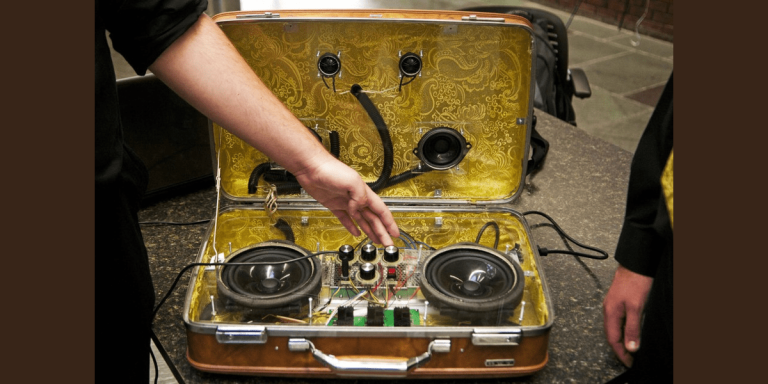
“I thought the project would be really fun because it fits my interests perfectly, and it would be an exciting challenge to figure out exactly what is needed on the inside of these things,”
Music-to-go is not a new idea, but as the saying goes, everything old is new again, and Dr. Doug Melton is putting that adage into practice with the “Audio Tourister” Capstone project for his B-Section Electrical Engineering Senior Design class at Kettering University.
Melton, professor of Electrical and Computer Engineering, assigned his students the task of designing a portable audio system in vintage luggage donated to the project by Goodwill of Mid-Michigan. The audio systems must be usable with modern portable music systems and be housed entirely within the vintage luggage (hence – everything old being made new).
Senior Design courses at Kettering, or “Capstone” as they are known on campus, is usually the last bridge for students between undergraduate education and the engineering profession. The course challenges students to integrate and synthesize their cumulative engineering knowledge to create something of their own design, coupling theory with practical application.
Melton got the inspiration for the assignment from junior Devin Hauersperger, a Mechanical Engineering major from Troy, Mich., who works for Harman Automotive Audio Systems as a co-op employee. She is minoring in Acoustics.
She is flattered to have inspired a capstone project. “I am very excited and flattered that Professor Melton is letting me be a part of all of this! I never thought my college career would be this amazing,” she said.
“I love doing projects on my own outside of school and work,” said Hauersperger. “The types of projects I like to do almost always combine technical and creative elements. I wish I could say I came up with this idea myself, but I didn’t. A co-worker saw a photo of a suitcase with speakers in it on the website http://blog.theboomcase.com/ and shared it with me. I thought the project would be really fun because it fits my interests perfectly, and it would be an exciting challenge to figure out exactly what is needed on the inside of these things,” she added.
Hauersperger enjoys taking old things and re-purposing, or modernizing them, which is why she likes the suitcase audio speaker project. “It involves creativity when it comes to the placement of the speakers in order to compliment the style of the suitcase, and technical abilities in the actual construction of the whole system,” she said.
The Capstone class teams had to design audio amplifiers and crossovers into the final product. They were also allowed to use microprocessors, memory cards, wireless or remote controls and other custom features. All this had to be accomplished with a minimal budget and strict time constraints.
“The design process is the emphasis of the course,” said Melton. “The designs take shape in student laboratory notebooks and then become a complete set of design documents, with professional schematics and drawings,” he added. A product development company, C & S Engineering Solutions, provided students with feedback through critical design reviews. Then teams had to produce their prototype.
Some of the project specifications included consideration for cost, weight and size, travel-worthiness and acoustic performance. “The specifications for the student-designed products is that they be capable of connecting to an iPod and playing all genres of music, including Dubstep to Daft Punk, Christmas to Country, Rap to Rock - but nothing from the Jonas Brothers,” joked Melton.
In addition to Goodwill’s donation of thirty pieces of vintage luggage, other corporate partners took an interest in the project and contributed components for building the prototypes. Harman and Panasonic donated woofers, tweeters and other loudspeakers. Livio Radio donated internet radios as an optional component.
Adding a new twist to the Capstone class, which generally culminates in a final demonstration of finished prototypes either in the classroom or for the campus community, Melton will host a public auction of the projects with proceeds going to benefit Goodwill.
Teams must prepare technical poster presentations of their final design and test results for public presentation, judging and auction in the Great Court of the Campus Center Dec. 9. The presentations begin at 4 p.m. with the auction at 5:20.p.m. Refreshments and food will be provided.
Judges for the projects included a representative from Panasonic, a musician and a representative from Goodwill. They will review each project based upon six criteria:
Design for commercialization;
Prototype and build quality;
Exterior aesthetics;
Sound performance;
Features and usability; and
Poster and spoken presentation.
What’s next for Hauersperger? “A few days ago I found the perfect suitcase. I think it is from the 40s. In a few weeks it is going to be packed full modern technology. I love that combination of old and new, but I also love just plain old stuff too. My current project is refinishing a 1923 RCA Victor Victrola. It is so cool to me to work on this old phonograph while listening to music on my "Boomcase.” I don't know if ironic is the right word to use, but I do know that it is pretty awesome,” said Hauersperger.
She is even considering adapting the audio systems into containers other than suitcases. “Theoretically they can be put in any enclosure or case,” she said, adding “I have recently been thinking about making them out of different types of instrument cases. I think a guitar case would be the best because it is the most obviously shaped like its contents. Someone could even make a guitar case into a guitar amp. I think that would be pretty cool.”
Contact: Dawn Hibbard
810.762.9865
dhibbard@kettering.edu